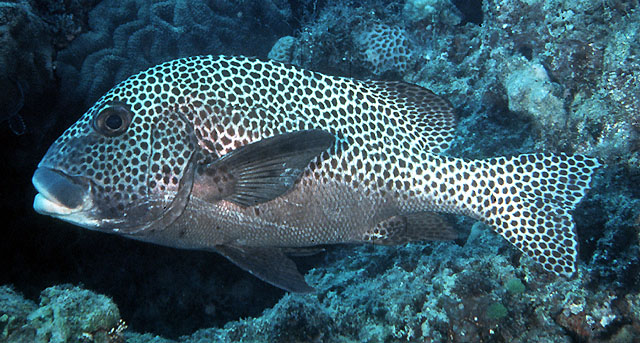| Haemulidae (Grunts), subfamily: Plectorhinchinae |
| 72 cm TL (male/unsexed); max.weight: 7,000.0 g |
|
reef-associated; brackish; marine; depth range 1 - 30 m |
| Indo_West Pacific: Maldives (Ref. 11303) and Cocos Islands (Ref. 9399); Sumatra to Fiji (Ref. 9710) and New Caledonia, north to Ryukyu Islands, south to Rowley Shoals. |
|
Dorsal spines (total): 11-12; Dorsal soft rays (total): 18-20; Anal spines: 3-3; Anal soft rays: 7-9. This species is distinguished by the following characters: chin with 6 pores, no median pit; gill rakers on first gill arch 9-12 + 1 + 27-32 = 36-43; D XII (rarely XI),18-20; longest dorsal-fin ray 16-25% of standard length, almost equal to length of soft dorsal-fin base in small specimens, more than 1/2 length of soft dorsal-fin base in adults; lips fleshy, moderately swollen with age; scales ctenoid (rough to touch); lateral line tubed scales about 52-59; body depth 2.4-2.5 in SL; caudal fin deeply forked with broadly rounded lobes in juveniles; only slightly forked to emarginate in adults. Colour of body with numerous dark brown spots, generally larger than pupil; pelvic fins spotted, darkening with age; juveniles brownish with large, well-defined creamy white blotches on body that include brown spots with age; colour gradually changing into a greyish background with large, deep brown spots (Ref. 47695, 90102). |
| Inhabits coral-rich areas of clear lagoon and seaward reefs. Adults are solitary, near and under ledges or caves by day. Juveniles are found among corals (Ref. 9710). Feeds on crustaceans, mollusks, and fishes at night. Juveniles are used in the aquarium industry (Ref. 9137). Small juveniles may mimic a toxic flatworm (Ref. 9710). Marketed fresh, a small quantity is salted. Large fish have coarse and dry flesh (Ref. 47695). |
|
Least Concern (LC); Date assessed: 12 April 2023 Ref. (130435)
|
| harmless |
Source and more info: www.fishbase.org. For personal, classroom, and other internal use only. Not for publication.
